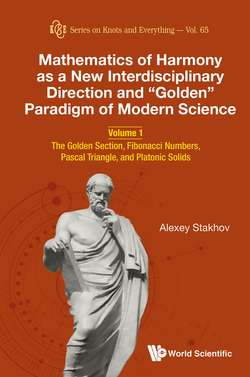Читать книгу Mathematics of Harmony as a New Interdisciplinary Direction and “Golden” Paradigm of Modern Science - Alexey Stakhov - Страница 20
На сайте Литреса книга снята с продажи.
1.1.2. Numerical harmony of Pythagoreans
ОглавлениеPythagoras and Heraclitus were philosophers and thinkers, whose names are usually associated with the beginning of the philosophical doctrine of Harmony. According to many authors, the key idea of Harmony as a proportional unity of opposites belongs to Pythagoras. Pythagoreans first put forward the idea of harmonious construction of the whole world, including not only Nature and Man but also the entire cosmos. According to Pythagoreans, “harmony is an inner connection of things, without which the cosmos could not exist” [10]. Finally, according to Pythagoras, harmony has a numerical expression, that is, it is integrally connected with the concept of number.
Pythagoras (570–500 BC) is perhaps one of the most famous scientists in the history of science. He is revered by every person who studies geometry and is familiar with the “Pythagoras theorem”, one of the most famous theorems of geometry. In ancient literature, Pythagoras has been described by his contemporaries as a well-known philosopher and scholar, a religious and ethical reformer, an influential politician, a demigod in the eyes of his disciples and a charlatan. His popularity was such that during his lifetime, coins with his image were issued in 430–420 BC. For the fifth century BC, this was an unprecedented case! Pythagoras was the first Greek philosopher awarded to a special assay (Fig. 1.1).
Fig. 1.1. Pythagoras.
The important role of Pythagoras in the development of Greek science consists in the fact that he fulfilled a historical mission in transferring the knowledge of the Egyptian and Babylonian priests into the culture of Ancient Greece. It was thanks to Pythagoras, who undoubtedly was one of the most educated thinkers of his time, that Greek science received a huge amount of knowledge in the fields of philosophy, mathematics and natural sciences, which, by getting into the favorable environment of ancient Greek culture, contributed to its rapid development.
Pythagoreans created the doctrine of the creative essence of the number. Aristotle in “Metaphysics” notes this particular feature of the Pythagorean doctrine:
“The so-called Pythagoreans, having engaged in mathematical sciences, first had put forth them forward and after their study began to consider them the beginnings of all things . . . Since, therefore, everything else was explicitly compared to numbers throughout their essence, and numbers took first place in the whole of nature, they had recognized harmony and number as the basis of all things and all Universe.”
